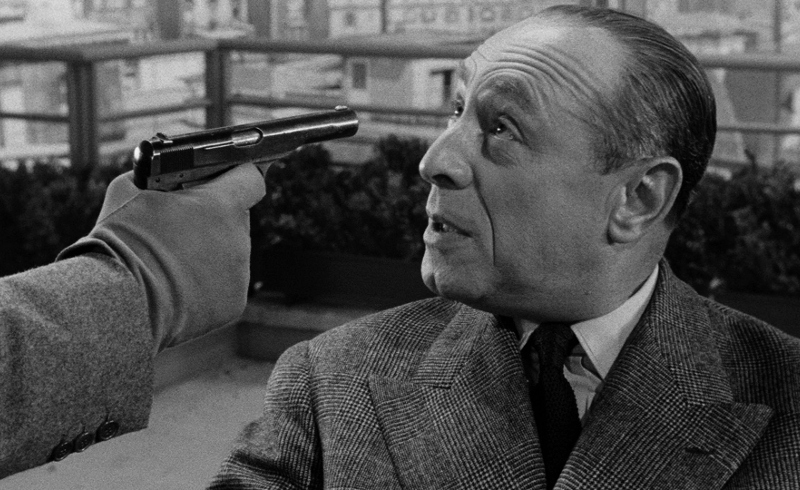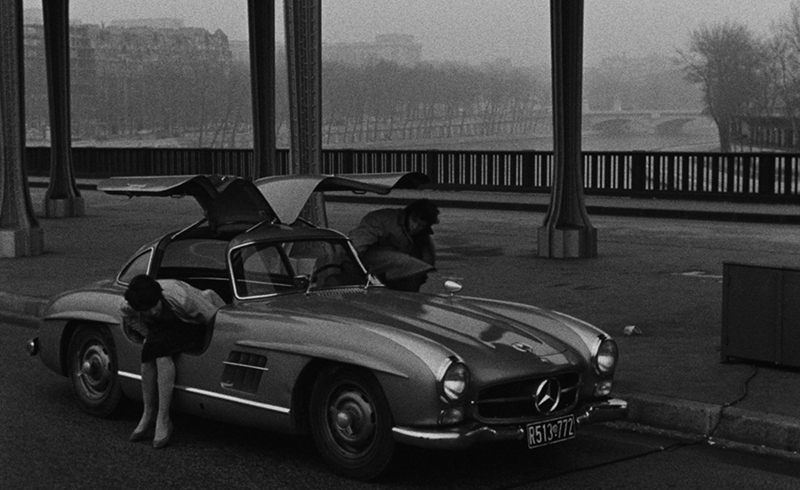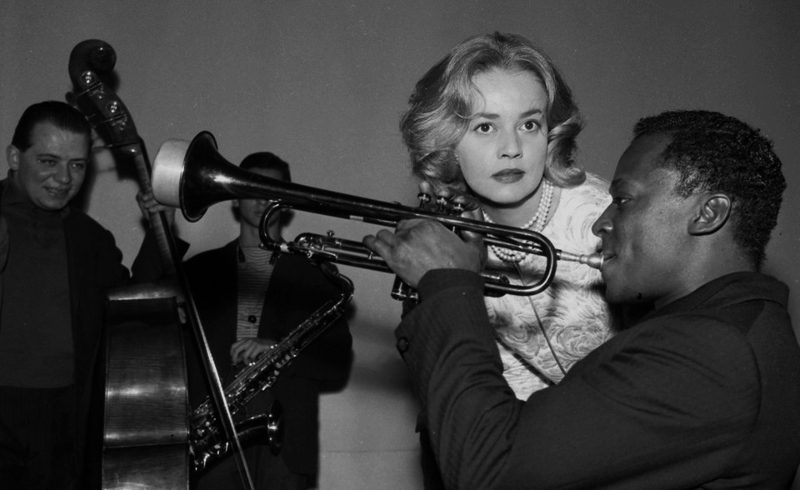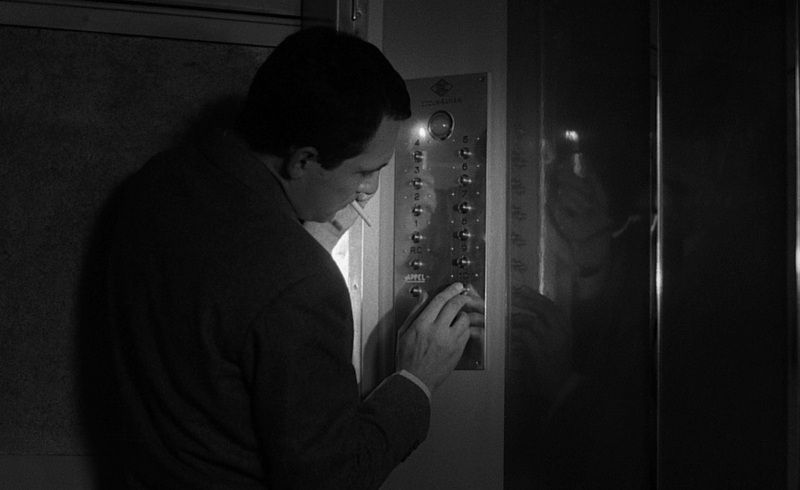| Reviews & Columns |
|
Reviews DVD TV on DVD Blu-ray 4K UHD International DVDs In Theaters Reviews by Studio Video Games Features Collector Series DVDs Easter Egg Database Interviews DVD Talk Radio Feature Articles Columns Anime Talk DVD Savant Horror DVDs The M.O.D. Squad Art House HD Talk Silent DVD
|
DVD Talk Forum |
|
|
| Resources |
|
DVD Price Search Customer Service #'s RCE Info Links |
|
Columns
|
|
|
Elevator To The Gallows: Criterion Collection
 Celebrated French director Louis Malles' first full-length solo effort, Elevator to the Gallows (1958), was and still is a fascinating examination of two separate crimes going very, very wrong. It focuses on two couples: the "A" story belongs to Florence and Julien (Jeanne Moreau and Maurice Ronet), lovers who conspire to kill her husband -- his boss, Simon (Jean Wall) -- on a Saturday night, just before the office closes. Carefully entering Simon's high-rise office from outside, Julien successfully pulls off the crime without being seen...but makes a fatal mistake by leaving a piece of evidence behind. Upon re-entry, Julien becomes trapped in an elevator when the building's power is shut off for the weekend. Meanwhile on street level, "B" story begins: Julien's car is stolen by teenage couple Louis and Veronique (Georges Poujouly and Yori Bertin), who joyride to a motel and spend the evening with two German tourists who'd be dead only hours later. Elevator to the Gallows maintains a tricky balance of suspense and visual dexterity more often than it stumbles. The setup is brilliantly done, and when "A" leads fatefully to "B", the dominoes keep falling as we see successful crimes fall apart when pieces of evidence are left behind and returned for. Small items like a grappling hook or candid photos, while not used with an intent to harm, eventually doom those who carry them. It's a fascinating reminder that "getting away clean" rarely happens and, though both couples commit their crimes for substantially different reasons -- and with very different levels of planning, I might add -- their eventual and deserved fates are, ironically, almost identical. The technical merits of Elevator to the Gallows, while partially diminished during the past six decades, are still very much evident. Its visual style is sleek and modern, with expert hand-held camerawork and an intoxicating atmosphere that owes a great deal to film noir while adapting it for a new generation. Miles Davis' now-iconic jazz soundtrack remains as smoky and stylish as ever, representing both a major turning point in his own career and film soundtracks in general. Yet the true beauty of Elevator to the Gallows is much of its simplicity: we witness the huge impact that one small night has on four different people who are never in the same place at the same time. Though a bit doughy around the middle (perhaps more from the streamlined efficiency of its beginning and end than anything else), it's a wonderful debut from a director who would continue to leave his stamp on French cinema and Hollywood during the next four decades. Criterion's 2006 release of Elevator to the Gallows on DVD was an excellent release from top to bottom, featuring a strong A/V presentation and an additional disc of bonus features. But time marches on: 12 years later, Criterion's new Blu-ray offers major improvements in the technical department -- and though we don't get any new bonus features this time around, it's well worth the upgrade for established fans and a fine jumping-on point for new ones.


 Presented in its original 1.66:1 aspect ratio, Criterion's sparkling new 1080p transfer of Elevator to the Gallows (sourced from Gaumont's 2K restoration of the original 35mm negative) is, unsurprisingly, miles ahead of their 2006 DVD. There's a stronger amount of detail and texture on display here, with an extremely crisp appearance and much more refined levels of contrast. Night scenes and dimly-lit interiors hold up very well, with excellent shadow detail and deep black levels. Digital imperfections, such as compression artifacts and excessive noise reduction, don't seem to be an issue at all. Film grain is thick and stable, which really adds to the atmosphere. Quite simply, this Blu-ray offers a pleasing presentation from a reliably good studio that should easily impress die-hard fans and newcomers alike.
There's less to say about the PCM 1.0 track, aside from that it's perfectly adequate and sounds better than expected for a film that's almost 60 years old. Dialogue, music cues, and background effects are very crisp and clear without fighting for attention, while the overall experience even manages to showcase a few moments of modest depth at times. To the best of my knowledge, this lossless mono presentation is true to the source material and purists will enjoy the lack of surround gimmickry. Optional English subtitles are included during the film and extras for translation purposes only.

 Criterion's interface is smooth and easy to navigate, with access to its timeline, chapters, and bonus features. The disc is locked for Region A players only; it's packaged in a stocky keepcase with stylish double-sided artwork that's very similar to their old DVD. The fold-out Booklet includes a reprinted essay by critic Terrence Rafferty, an interview with Louis Malle, a tribute by film producer Vincent Malle (his brother), and notes about Gaumont's new restoration.
 Everything from Criterion's two-disc 2006 release, with the only difference being that everything now fits comfortably on a single Blu-ray. These recycled extras include a 2005 Interview with actor Jeanne Moreau, a 1975 Interview with director Louis Malle, a combined ""Malle and Moreau at Cannes" interview piece from 1993, separate Interviews with actor Maurice Ronet and original soundtrack session pianist René Urtreger, a Program about Miles Davis' score, Louis Malle's Student Film Crazeologie, and Elevator to the Gallows' Theatrical Trailer. While perhaps the addition of a commentary might have put this one over the top, it's great that such a well-rounded collection of extras has been preserved here.
 A confident and, at times, very well-paced debut film from celebrated director Louis Malle, Elevator to the Gallows is an atmospheric examination of flawed characters on two sides of the same coin. Though its structure -- and more importantly, what it chooses to show us -- occasionally robs certain scenes of suspense (especially the middle portion, which spins its wheels quite a bit), the film's setup and conclusion are extremely well done and overshadow any less impressive moments by a wide margin. That's not even factoring in Miles' Davis hugely influential and important score, or the rich black-and-white cinematography by French New Wave regular Henri Decae (Bob le Flambeur, Le Samourai. Criterion's new Blu-ray package is a more efficient version of their own 2006 release, pairing a much-improved A/V presentation with the same outstanding bonus features on a single disc. Firmly Recommended for fans and first-timers alike. |
|
| Popular Reviews |
| Sponsored Links |
|
|
| Sponsored Links |
|
|
| Release List | Reviews | Shop | Newsletter | Forum | DVD Giveaways | Blu-Ray | Advertise |
|
Copyright 2024 DVDTalk.com All Rights Reserved. Legal Info, Privacy Policy, Terms of Use,
Manage Preferences,
Your Privacy Choices | |||||||














